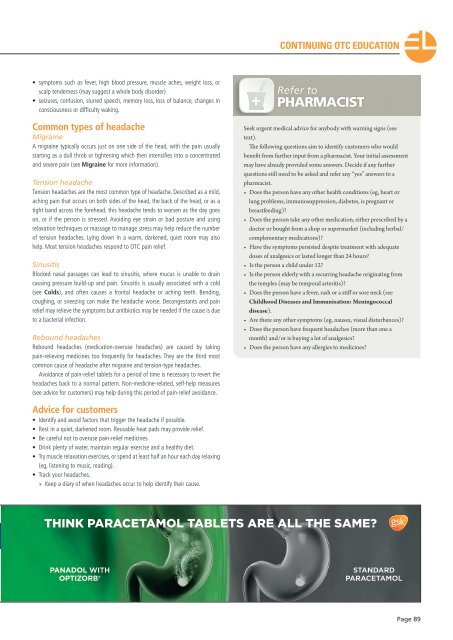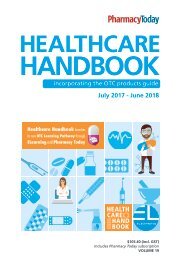2017 HCHB_digital
You also want an ePaper? Increase the reach of your titles
YUMPU automatically turns print PDFs into web optimized ePapers that Google loves.
CONTINUING OTC EDUCATION<br />
• symptoms such as fever, high blood pressure, muscle aches, weight loss, or<br />
scalp tenderness (may suggest a whole body disorder)<br />
• seizures, confusion, slurred speech, memory loss, loss of balance, changes in<br />
consciousness or difficulty waking.<br />
Common types of headache<br />
Migraine<br />
A migraine typically occurs just on one side of the head, with the pain usually<br />
starting as a dull throb or tightening which then intensifies into a concentrated<br />
and severe pain (see Migraine for more information).<br />
Tension headache<br />
Tension headaches are the most common type of headache. Described as a mild,<br />
aching pain that occurs on both sides of the head, the back of the head, or as a<br />
tight band across the forehead, this headache tends to worsen as the day goes<br />
on, or if the person is stressed. Avoiding eye strain or bad posture and using<br />
relaxation techniques or massage to manage stress may help reduce the number<br />
of tension headaches. Lying down in a warm, darkened, quiet room may also<br />
help. Most tension headaches respond to OTC pain relief.<br />
Sinusitis<br />
Blocked nasal passages can lead to sinusitis, where mucus is unable to drain<br />
causing pressure build-up and pain. Sinusitis is usually associated with a cold<br />
(see Colds), and often causes a frontal headache or aching teeth. Bending,<br />
coughing, or sneezing can make the headache worse. Decongestants and pain<br />
relief may relieve the symptoms but antibiotics may be needed if the cause is due<br />
to a bacterial infection.<br />
Rebound headaches<br />
Rebound headaches (medication-overuse headaches) are caused by taking<br />
pain-relieving medicines too frequently for headaches. They are the third most<br />
common cause of headache after migraine and tension-type headaches.<br />
Avoidance of pain-relief tablets for a period of time is necessary to revert the<br />
headaches back to a normal pattern. Non-medicine-related, self-help measures<br />
(see advice for customers) may help during this period of pain-relief avoidance.<br />
Refer to<br />
PHARMACIST<br />
Seek urgent medical advice for anybody with warning signs (see<br />
text).<br />
The following questions aim to identify customers who would<br />
benefit from further input from a pharmacist. Your initial assessment<br />
may have already provided some answers. Decide if any further<br />
questions still need to be asked and refer any “yes” answers to a<br />
pharmacist.<br />
• Does the person have any other health conditions (eg, heart or<br />
lung problems, immunosuppression, diabetes, is pregnant or<br />
breastfeeding)?<br />
• Does the person take any other medication, either prescribed by a<br />
doctor or bought from a shop or supermarket (including herbal/<br />
complementary medications)?<br />
• Have the symptoms persisted despite treatment with adequate<br />
doses of analgesics or lasted longer than 24 hours?<br />
• Is the person a child under 12?<br />
• Is the person elderly with a recurring headache originating from<br />
the temples (may be temporal arteritis)?<br />
• Does the person have a fever, rash or a stiff or sore neck (see<br />
Childhood Diseases and Immunisation: Meningococcal<br />
disease).<br />
• Are there any other symptoms (eg, nausea, visual disturbances)?<br />
• Does the person have frequent headaches (more than one a<br />
month) and/or is buying a lot of analgesics?<br />
• Does the person have any allergies to medicines?<br />
Advice for customers<br />
• Identify and avoid factors that trigger the headache if possible.<br />
• Rest in a quiet, darkened room. Reusable heat pads may provide relief.<br />
• Be careful not to overuse pain-relief medicines.<br />
• Drink plenty of water, maintain regular exercise and a healthy diet.<br />
• Try muscle relaxation exercises, or spend at least half an hour each day relaxing<br />
(eg, listening to music, reading).<br />
• Track your headaches.<br />
»»<br />
Keep a diary of when headaches occur to help identify their cause.<br />
THINK PARACETAMOL TABLETS ARE ALL THE SAME?<br />
PANADOL WITH<br />
OPTIZORB®<br />
STANDARD<br />
PARACETAMOL<br />
10/04/17 5:17 pm<br />
Page 89



